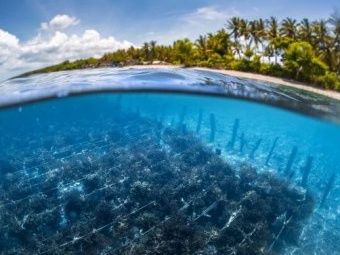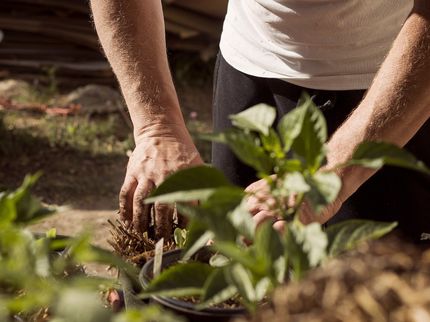Farming more seaweed for food, feed and fuel
A University of Queensland-led study has shown that expanding global seaweed farming could go a long way to addressing the planet’s food security, biodiversity loss and climate change challenges.

UQ research suggests the planet needs more seaweed farms like this one in Indonesia.
Dudarev Mikhail
PhD Candidate Scott Spillias, from UQ’s School of Earth and Environmental Science, said seaweed offered a sustainable alternative to land-based agricultural expansion to meet the world’s growing need for food and materials.
“Seaweed has great commercial and environmental potential as a nutritious food and a building block for commercial products including animal feed, plastics, fibres, diesel and ethanol,” Mr Spillias said.
“Our study found that expanding seaweed farming could help reduce demand for terrestrial crops and reduce global agricultural greenhouse gas emissions (GHG) by up to 2.6 billion tonnes of CO2-equivalent per year.”
Researchers mapped the potential of farming more of the 34 commercially important seaweed species using the Global Biosphere Management Model.
They estimated the environmental benefits of a range of scenarios based on land-use changes, GHG emissions, water and fertiliser use, and projected changes in species presence by 2050.
“In one scenario where we substituted 10 per cent of human diets globally with seaweed products, the development of 110 million hectares of land for farming could be prevented,” Mr Spillias said.
“We also identified millions of available hectares of ocean within global exclusive economic zones* (EEZs), where farming could be developed.
“The largest share of suitable ocean was in the Indonesian EEZ, where up to 114 million hectares is estimated to be suitable for seaweed farming.
“The Australian EEZ also shows great potential and species diversity, with at least 22 commercially viable species and an estimated 75 million hectares of ocean being suitable.”
Mr Spillias said many native species of seaweed in Australian waters had not yet been studied from a commercial production perspective.
“The way I like to look at this is to think about ancestral versions of everyday crops – like corn and wheat – which were uninspiring, weedy things,” he said.
“Through thousands of years of breeding we have developed the staple crops that underpin modern societies and seaweed could very well hold similar potential in the future.”
UQ study collaborator Professor Eve McDonald-Madden said the seaweed solution would have to be carried out with care, to avoid displacing problems from the land to the ocean.
“Our study points out what could be done to address some of the mounting problems of global sustainability facing us, but it can’t be implemented without exercising extreme caution,” she said.
This research was published in Nature Sustainability.
UQ acknowledges the collaborative efforts of researchers from the International Institute for Applied Systems Analysis, CSIRO and the University of Tasmania.
*An area of the sea in which a sovereign state has special rights regarding the exploration and use of marine resources, including energy production from water and wind.
Most read news
Topics
Organizations
Other news from the department science

Get the food & beverage industry in your inbox
By submitting this form you agree that LUMITOS AG will send you the newsletter(s) selected above by email. Your data will not be passed on to third parties. Your data will be stored and processed in accordance with our data protection regulations. LUMITOS may contact you by email for the purpose of advertising or market and opinion surveys. You can revoke your consent at any time without giving reasons to LUMITOS AG, Ernst-Augustin-Str. 2, 12489 Berlin, Germany or by e-mail at revoke@lumitos.com with effect for the future. In addition, each email contains a link to unsubscribe from the corresponding newsletter.



























































